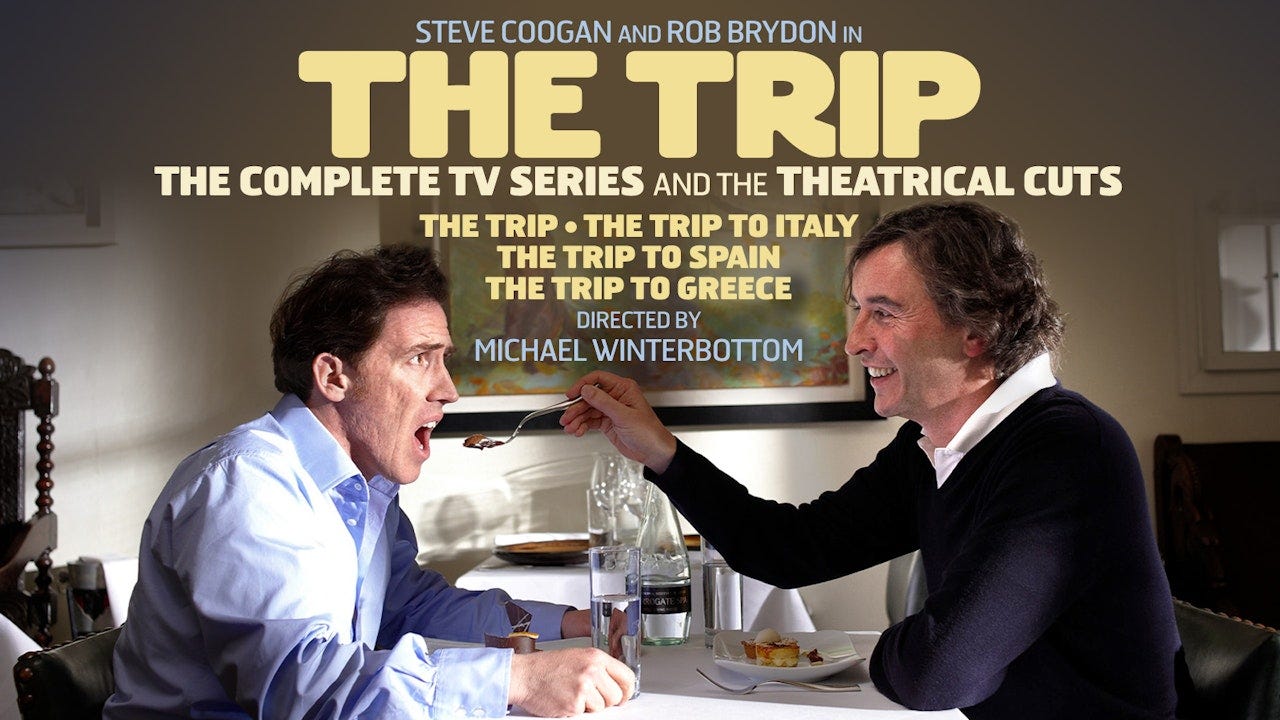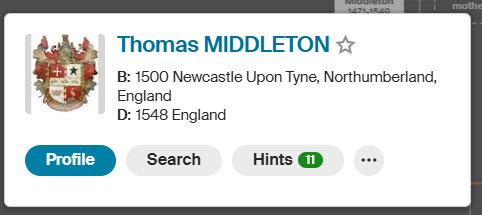Retro-Review: The Trip (2010)
From TV Series to Theatrical Phenomenon
As much as I complain about modern critics (by which I mean a timeline from Pauline Kael to Present) and their use of an assumed “List of Films You are Supposed to Like,” I am a long time subscriber to the Criterion Channel which might be viewed as a streaming service filled with pretty much nothing but “Films You are Supposed to Like.” I think there’s some truth to that, but I think that the past couple of years have shown a willingness on the part of Criterion’s creators to go beyond that List and into a general celebration of film.
One might argue that their inclusion of films like Joseph McGrath’s and Terry Southern’s The Magic Christian, Kevin Smith’s Mallrats, and Sammo Hung’s The Magnificent Butcher are all demonstrative of Criterion pandering to niche, and heavily gate kept, cineaste communities. You know the kind of cineaste I’m talking about, they like outré entertainment, but only if it’s highly curated and specialized. It has to meet certain countercultural (McGrath and Southern and Smith) or non-American (Sammo Hung) checkboxes before it qualifies as likable. Such people will praise Hung’s work in Encounters of a Spooky Kind while critiquing Chris Farley and Adam Sandler films. I love Hung, so much that I own the Martial Law DVD collection, but other than being an excellent acrobat (and thus great at choreographed martial arts) Sammo is pretty much the Hong Kong equivalent of Chris Farley. Both are capable of emotional depth, but both spend a lot of time in Sillyland. The inclusion of these films might thus be dismissed as highly curated “Bad Films You are Allowed to Like,” but I think there is more going on.
Criterion, after all, has famously released a Criterion Edition of Armageddon and The Rock. If you own those editions, and I do, you know that the special features aren’t filled with ironic reinterpretations and evaluations but are straight forward celebrations of the form. I wish their version of The Blob was more sincere celebration of the form and less, “this one transcends the genre,” but the fact that they took it seriously in the first place matters on my “are they pretentious or celebratory” meter. Other examples of Criterion just being a place that celebrates film is their inclusion of Bill Duke’s Deep Cover, George Armitage’s Grosse Pointe Blank, and Thomas Schlamme’s So I Married an Axe Murderer. Given how much time Schlamme’s film spends making fun of pretense, I’m pretty sure it’s there because it’s great and has a great soundtrack. In other words, when Criterion says they are about celebrating all films, I believe them. Sure, they include films from the “List,” but they also include films left off the list that are worth seeing like Leo McCarey’s absolutely divine Love Affair. Any streaming service that promotes the work of Irene Dunne gets a lot of leeway from me, she is the first real queen of the romantic comedy.
Okay, that was a really long lead in just so that I could say that I was scrolling through the Criterion Channel application the other day and saw that they were featuring the entire collection of The Trip films and tv series starring Steve Coogan and Rob Brydon. As an American, the first time I remember seeing Steve Coogan in anything was when he played Phileas Fogg in Around the World in 80 Days with Jackie Chan and I was completely unfamiliar with Rob Brydon, though since seeing him in The Trip I’ve become a regular viewer of Would I Lie to You?.
In 2010, these two comedians starred in an award winning BBC series entitled The Trip. The series was 6-episodes long, as is fairly typical of one-hour or half-hour long shows in England. Try as I might, I’ll never completely understand how the British television season structure works. Shows are released at what seems like random times, and if we are talking older eras then the show might be released at different times in different areas of England (as happened with ITV’s The Prisoner). Shorter shows, get 6 episodes and longer shows get 3 or maybe four episodes. Like Australian Rules Football, the length of series seems to depend on the whim of producers. As much as I think that the six episode season of Dalgliesh might allow for better writing than the breakneck pace of the 22 to 24 episode American broadcast schedule for a show with a “full order” (that’s a pilot, front nine, then 13, then full season for a new show which is its own kind of confusing), that’s as much a product of the quality of P.D. James’ source material as it is the writers adapting the material. Besides, when shows like The Art Detectives are willing to lift a conceit from Agatha Christie’s Sparkling Cyanide, as they did in the Noble Rot episode (without giving credit I might add), I think that argues against shorter schedules leading to more “original” programming, but that is all a side note. I enjoyed The Art Detectives, but please cite your inspirations.
Anyway, back to The Trip. The show was nominated for a BAFTA for best situation comedy and Steve Coogan won a BAFTA for best male performance in a comedy role. In 2011, the television series was edited into a feature film distributed in the United States by IFC films. Since that time, there have been a number of follow up series and films, but it has been a while since I watched the original and so it was a good time to reapproach the material.
The movie, like the television series, is a mockumentary about two comedic actors named Steve and Rob whose careers and lives bear a striking resemblance to those of Steve Coogan and Rob Brydon. One might best look at it as if these are alternate reality versions of the same character, or at least that it’s an alternate reality Steve Coogan because I can only hope his narrative arc is scripted and not lived without weeping in empathy for him, even as narcissistic as he is in the film/series.
The Trip opens with Steve calling Rob to ask if Rob would be available to go on a trip where the two of them would critique a number of high end restaurants in the North of England. I recently learned that “The North” is where some of my ancestor’s come from, the Middleton’s, and one of the descendants Sir William Middleton lived to be 74-ish during the Wars of the Roses. I don’t know how crafty or puissant you have to be to survive that long during that struggle, but I imagine it would require some combination of political and physical prowess.
Near as I can tell, my ancestors were Yorkists which means that in Game of Thrones terms, they were Starks and I can deal with that. I’m not certain though as I’ve only scratched the surface here and heaven knows I’m no expert at navigating the complexities of Ancestry.com’s system.
Meanwhile, back at the ranch, Steven has accepted a commission from The Observer newspaper to do a travelogue and review column of the locations along the trip. When he initially accepted the commission Steven planned to have his gourmand girlfriend Mischa accompany him, but their relationship has been put "on hold" as she has traveled to the United States in the hopes of getting some journalistic commissions of her own. Steven has run out of options for companions, and so he asks his co-worker and “friend” of 11 years Rob to join him on the trip.
The movie is a delightful buddy comedy which takes advantage of the Steven's and Rob's comfortable friendship to create a touching and believable narrative, while also allowing for some conflict and real emotional depth. It is possible to enjoy the film just for the buddy comedy that it is, but it is also a film that works on two additional levels. (This is the point where the YouTube expert tells you this was AI written because of my use of the phrase “two additional levels,” but regular readers know I love to break things down into “twos” as an almost Aristotelian obsession).
The first additional level is as a visual travelogue showing us the landscape of the North of England. In this respect the film is truly beautiful. The cinematographer captures the moors, mountains, and pastures magnificently and the picturesque representations of bucolic England are one of the best advertisements for a vacation to the country that one could imagine. Add to the visual beauty food that ranges from the exquisite to the weird, and a nice touch of history, and you have a film that works as a proxy for the travelogue that the Steven character is supposed to be writing. In making a film depicting a writer journeying to acquire material, the film has managed to visually tell the tale as the character might well be writing. It may be a mockumentary about a travelogue food critique tour, but it is also a very real example of an excellent travelogue foot critique tour. It’s very meta in this way.
The second, and more profound, narrative and emotional level the film plays with is when it delves into the nature of the lives of Steven and Rob. The plot of the film includes several conversations that reveal the backgrounds of the characters, and their interpersonal conflicts, and social commentary abounds in these conversations. Steven represents the urban sophisticate and Rob the bourgeois.
Steven is the more "internationally famous" actor who has starred in American films and who is seeking more work in America. He’s the kind of narcissistic actor who tells his British agent that he doesn't want to do any more British television. He wants to star in important independent films, and doesn't have time to star as the "baddie" in an upcoming episode of Doctor Who. Steven is not content with his professional life, and seeks to do something "important." He wants to work only on films/television that would be on a “List of Things You are Supposed to Like.” See? I brought it back after that very long introduction.
Rob's work has mostly been in British television where he is known for his uncanny impressions and for a particular vocal gimmick called "small man trapped in a box." Before I continue describing Rob's life, you really must experience the small man bit. It is remarkable, and I couldn't believe it wasn't done with post-production tricks -- but it is something very real and done with great skill.
Rob is portrayed as a working class actor who is quite content with his career and who deeply appreciates the respect and admiration he receives from his fans. Rob is the kind of actor my wife and I have always called “a worker.” They take the gigs and always do their best, whether it’s William Castle or William Shakespeare. Where Steven is dour, Rob is cheerful -- infectiously so.
It isn't merely creatively that Steven is frustrated. His personal life is also the shambles. His girlfriend has just left him, though he is trying to keep a connection to her, and his divorce has had a predictable affect on his relationship with his son, a son who is rebelling a bit and who is in need of a positive role model. Steven can't maintain a long term relationship, and he cannot quite keep track of the one night stands he has had. He is so caught up in the life of the "artiste" and trying to be a kind of tragic artist in personality, that it is hard for him to truly connect with another person. There is a wonderful moment in the film where he is getting high in a room once used by Coleridge. Steven is trying his best to affect a kind of moody poetic persona, that it creates a powerful yet muted comedic moment.
The opposite is true of Rob's life. He and his wife have only recently had a baby. They have a strong and delightful relationship filled with laughs. Where Steven's phone calls end in sighs and "I have to go nows," Rob's conversations don't end on screen. One can imagine that the playful dialogue between Rob and his wife continues until either they both fall asleep or until the baby awakens in need of some care. The moments where Rob converses and flirts with his wife on the phone are some of the most personal and magical in the film.
It should be noted that all of Steven's phone calls take place via cell phone, and that his quest for cell phone signals is a humorous sub-plot on its own, while all of Rob's phone calls are on land line. The cell phone is presented as cold and distant and never really allows the people on either end of the phone to "connect," whereas the land line is portrayed intimately and conversations via land line are akin to cuddling.
Once more the "urban sophisticate" is contrasted to the simpler "bourgeois," a major theme of the film that is portrayed in a number of ways -- always with the "sophistication"/elitism being shown as failing or inappropriate. Steven rents a Land Rover because "the north has hills," he has accepted a commission to write about food without any real knowledge of food, and so on.
Two of my favorite moments are the very much talked about "Dueling Michael Caines" scene and the "We Rise at Daybreak" scene. The Michael Caine scene is a perfect demonstration of the conflict between the two characters. Steven cannot believe that his “television” talent friend could be better at impersonating Michael Caine than he is. After all, he’s a thespian and not a game show host. His performance has depth. Right? It’s a wonderful sequence that is laugh out loud funny that demonstrates that both have excellent Caine impersonations, and that shows their friendship and conflict.
The "We Rise" scene shows a different side of their relationship. While there is still a bit of one-upmanship, this time it is of the playful and longtime friend sort. These are just two longtime friends who are enjoying the countryside and riffing on something that they find funny. Here the competition is still to be better than your friend, but knowing that the only audience you’ll ever have is that same friend. This scene is maybe one of my favorite comic bits ever. It ranks with the classic Abbott and Costello "Who's on First" bit in my mind and I can watch it on loop.
Witty, subtle, beautiful, and rewatchable. The Trip is one of those rare films that makes a short trip seem like an epic journey, all while never being anything other than a small trip. It praises family over fame and friendship over facade. The first entry in The Trip franchise is in my list of perfect films and will certainly be in the “mockumentary” section of my 5-Foot Geek Bookshelf.







A film/tv show/whatever you want to call it that I really enjoy.